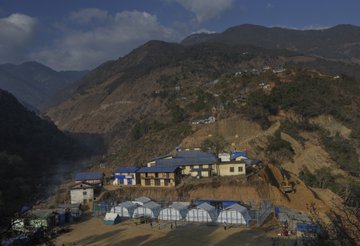Following the devastating 6.4 magnitude earthquake that struck Nepal’s Karnali Province on 3 November 2023, over 70 health facilities were damaged, severely impeding the provision of essential health services.
“After the earthquake, we were in a dire situation as two of our buildings were completely damaged. We had to transfer patients to makeshift tents and deal with influx of patients,” said Rajesh Singh, Acting Chief of Basic Hospital Dalli, Nalgad Municipality, Jajarkot.
In response to the urgent need to continue medical services in severely affected areas such as the basic hospital in Nalgad, WHO set up three temporary health facilities using medical camp kits (MCKs), at the request of the Ministry of Health and Population (MoHP).
The MCKs — two in Jajarkot District and one in Rukum West District — collectively cater to 60 000 individuals residing in these hard-to-reach areas of Nepal.
MCKs were first introduced in Nepal following the 2015 earthquake, when WHO supported the MoHP to establish 41 MCKs in the 14 most affected districts. These facilities proved vital in reinstating primary healthcare services in a timely manner.
The MCKs, which consist of different tents, provide a suitable environment for health services while permanent structures are being rebuilt — a process expected to take 1-2 years to complete. The tents are also customized to accommodate Nepal’s seasonal changes.
The provided facilities encompass a range of wards catering to outpatient services, laboratories, pregnancy examinations, breastfeeding, administrative functions and storage needs. Additionally, these are equipped with supplementary items such as stretcher trolleys, metal trunks, jerry cans, dustbins, community water filters, camp cots, foldable plastic beds, blood pressure measurement equipment, individual tents and other essentials.
The first MCK was established in the premises of Basic Hospital, Limsa, Barekot Rural Municipality. This MCK consists of six tents, offering a range of services including outpatient consultations, laboratory, and maternity care to 40-50 patients each day. Moreover, the facility is outfitted with a six-unit solar electricity system, ensuring uninterrupted power supply for vital medical equipment in the birthing center.
The second MCK was installed in the premises of Primary Hospital, Dalli, Nalgad Municipality, which also serves approximately 50 patients daily. This MCK consists of five tents, which are being used to operate an emergency ward, an inpatient ward, an outpatient consultation room, and administrative and storage room. The MCK is further equipped with handwashing facilities and solar power for lighting and operation of basic appliances.
The third MCK, also Nepal’s first panel-based MCK, was established at Aathbiskot Municipality in Rukum West. The panel-based medical camp kit comprises three rooms, capable of accommodating eight patient beds, with outpatient services set up at Ghetma Health Post in the municipality.
WHO also provided a complete set of interagency emergency health kits (IEHK) to ensure a fully functional health facility set-up in each of the MCKs. The IEHK includes essential medicines and basic medical supplies to cater to the health needs of a population of 10 000 individuals for three months.
Post-earthquake, these MCKs are supporting to bridge the gap towards continuation of essential health services, but more importantly, a sense of security for the people of Jajarkot and Rukum West while they focus on rebuilding permanent infrastructure.
The third MCK, also Nepal’s first panel-based MCK, was established at Aathbiskot Municipality in Rukum West. The panel-based medical camp kit comprises three rooms, capable of accommodating eight patient beds, with outpatient services set up at Ghetma Health Post in the municipality.
WHO also provided a complete set of interagency emergency health kits (IEHK) to ensure a fully functional health facility set-up in each of the MCKs. The IEHK includes essential medicines and basic medical supplies to cater to the health needs of a population of 10 000 individuals for three months.
Post-earthquake, these MCKs are supporting to bridge the gap towards continuation of essential health services, but more importantly, a sense of security for the people of Jajarkot and Rukum West while they focus on rebuilding permanent infrastructure.
“We were able to quickly respond to the MoHP’s request and deploy these medical camp kits to the most affected areas due to our prior experience in the 2015 earthquake. I am proud to say that we were able to support Nepal during its time of need in ensuring continuity of health services,” said Dr Rajesh Sambhajirao Pandav, WHO Representative to Nepal.
Funded by the South-East Asia Regional Health Emergency Fund (SEARHEF) and Contingency Fund for Emergencies (CEF), these MCKs exemplify a commitment to promptly address healthcare needs in times of disasters and public health emergencies.


Comments are closed.